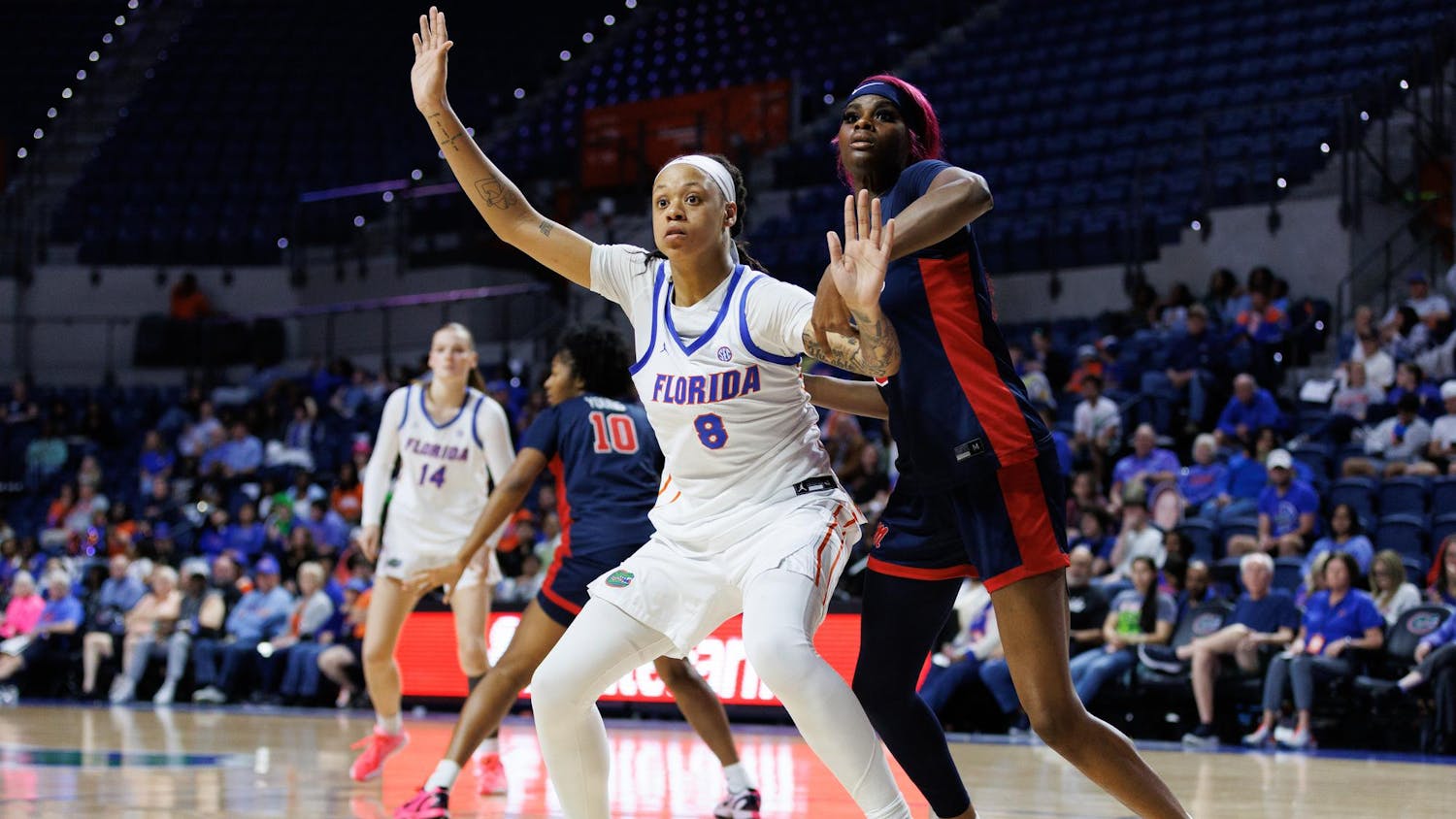For Graduate Assistants United, higher pay and the ability to pause academic work to do administrative tasks benefits their union. But the university is hesitant to foot the bill for the $25 million it says the requested pay increases would cost.
UF and Graduate Assistants United held an impasse hearing in front of a special magistrate, a legal expert who hears both sides and recommends the best course of action, in the Reitz Union Senate Chamber Monday morning. Dozens of graduate students attended in person and over Zoom in support of GAU.
The ongoing fight
The two parties reached an impasse July 31 over two articles in the union’s Collective Bargaining Agreement, which they have been negotiating since September 2023.
“To be clear, we’re not trying to get rich from this job,” said Cassie Urbenz, GAU’s co-president. “We’re just asking the university for help to survive.”
The union negotiates increasing stipends, which act as fixed salaries for graduate assistants, each year. Under Article 10, the stipends are currently at $19,200 for a nine-month minimum stipend and $25,600 for a 12-month minimum stipend, a historic raise from the past $17,000. But GAU said it still isn’t a livable wage.
UF’s General Counsel and Chief Negotiator Shayne Thomas and Patrick Keegan wrote in a statement they are waiting for the special magistrate’s recommendation and “have nothing further to add.”
GAU is now asking for a $26,000 minimum stipend, down from the minimum $44,000 stipend it requested in April. The change in request is a stepping stone toward GAU’s end goal, Urbenz added.
To make their case for a higher wage, Urbenz and GAU co-president Austin Britton presented data from a 2023 graduate student poll to the special magistrate..
“We have been underpaid for a long time, and we need that step up to ensure that every worker deserves and gets the respect they need,” Britton said.
GAU’s data indicated half of graduate assistants’ stipends cover their expenses with nothing left over. To make ends meet, 65% of UF graduate assistants rely on their families, friends or spouses; 20% work additional jobs during the year and 21% work additional jobs in the summer; and 58% dip into savings, according to GAU’s Monday presentation.
A 12-month minimum stipend is almost equal to the cost of living in Alachua County as recently as 2020. The costs and percentages presented could have only increased since 2023, Urbenz and Britton argued.
They compared UF stipends to other state universities, like Florida State University and the University of South Florida. Despite UF ranking well above FSU and USF, according to U.S. News & World Reports, UF graduate assistants are paid thousands less, the co-presidents said.
While UF’s stipends have not increased, UF’s total assets increased by $2.5 billion over the last decade, according to Urbenz and Britton’s data.
Another point of disagreement was Article 16, which defines the union’s released time program. The program allows graduate assistants to be temporarily released from academic work to contribute to union administrative tasks. Graduate assistants on released time are paid to file paperwork, connect with departments and handle grievances during the union’s office hours.
UF wants to strike the release time program, which Urbenz and Britton said has been a part of the GA program for over 20 years.
UF has not explained why the release time program is no longer beneficial, Urbenz said, despite the programs' decades-long existence with no challenge.
Over the summer, GAU was willing to accept UF’s offer to alter the release time program and a “last, best, final offer”; however, with continued delays to ratify it by UF, GAU requested a step toward a living wage to GAs and a continuation of the release time program.
UF’s side
Michael Mattimore, UF’s representative during the impasse hearing, said GAU’s requests would cost the university about $25 million. By contrast, the last wage increase cost just $5 million, Mattimore said.
“The difference is just shot,” he said.
UF’s goal is to have its graduate students leave the university and get “large-compensation jobs,” he said, and many with the minimum stipend go on to earn a doctorate, which has a starting salary of $95,700 in the Southeast U.S. According to College Factual, the average starting PhD graduate salary in the Southeast region is about $74,000.
As for the release time program, Mattimore said administrative work interrupts academic work and “is not good policy.”
“What UF has pledged to do is accommodate the schedules of representatives to allow maximum participation with the minimum destruction to their employment,” Mattimore said.
The hearing ended in two hours. Now, both parties must file briefs detailing their requests to the special magistrate by Dec. 15. The special magistrate will decide on a recommendation for a course of action by Dec. 19, according to Urbenz.
After the fact
Kay Yehezekely, a 22-year-old UF gender, sexuality and women’s studies second year masters student, said she feels disappointed with the impasse process.
“It’s just kind of disheartening to see that the university is so committed to not increasing our wages to a livable wage,” Yehezekely said.
She said many graduate students are barely making ends meet. Many are living paycheck to paycheck, she said, and it is difficult to afford basic living expenses, like groceries.
Yehezekely said she thinks she will have graduated by the time a decision is made and change is implemented.
The work GAs do is important, and more resources towards the program could only be a positive thing, she said.
“We give the university so much,” Yehezekely said. “We give them our time, we work for them as graduate assistants, and we deserve to have a livable wage.”
Contact Angelique Rodriguez at arodriguez@alligator.org. Follow her on X @angeliquesrod.

Angelique is a first-year journalism major and the Fall 2025 graduate school reporter. In her free time, she'll probably be reading, writing, hanging out with her friends or looking through the newest fashion runway shows on Vogue.






